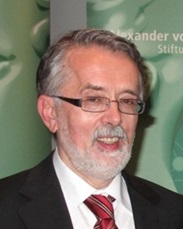 |
Professor of Computer Systems Engineering
|
Zoran Salcic is a professor of computer systems engineering at the University of Auckland, New Zealand. He leads research in the domains of embedded systems and industrial informatics and currently serves as the Head of the Department of Electrical and Computer Engineering. He has the BE (1972), ME (1974), and PhD (1976) degrees in electrical engineering from the University of Sarajevo. He did most of his PhD research at the City College New York (CCNY). His main research interests include complex digital systems design, custom-computing machines, reconfigurable computing, processor and computer systems architectures, embedded systems and their implementation, design automation tools for embedded systems, hardware-software co-design, new computing architectures and models of computation and languages for heterogeneous systems, and wireless sensor and actuator networks. He has published near 300 peer-reviewed journal and conference papers, books and book chapters and numerous technical reports. He is a Fellow of the Royal Society (Academy of Science) New Zealand and recipient of Alexander von Humboldt Research Award in 2010.
Building Systems of Things – Looking Beyond Internet of Things
Industrial systems and automation is undergoing a huge change enabled by technologies that underpin Internet of Things. While ubiquitous things allow creation of new classes of applications unseen in the past, they also open new challenges and opportunities in using things in creation of completely new closed systems, based on things, which will define our future activities and life. Such systems, we call them Systems of Things, or simply SoT, require radically new approach to designing distributed software systems and pose significant challenges, but also offer huge rewards. Systems of Things, that are highly concurrent and distributed systems, require seamless integration and composition of concurrent software processes that implement things with usual software processes running on Internet-connected computers and Cloud. In this talk we present a software design approach based on SystemJ programming language, developed at the University of Auckland, that enables building Systems of Things that are underpinned by a formal model of computation and guarantee correct by design systems, even going into the domain of real-time.